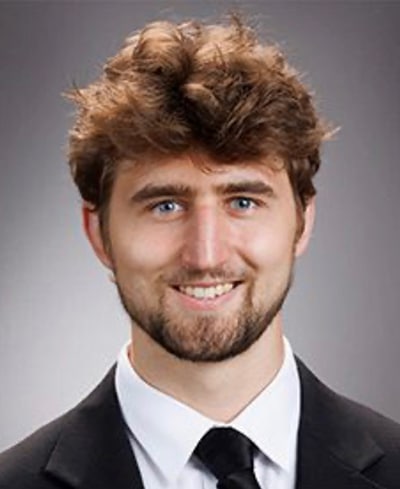John Flanagan believes he has the best job that a layperson could do.
Flanagan serves as the executive director of the Laboure Society, a non-profit on the front lines of helping those discerning a religious vocation overcome student loan debt.
“I have the best job that a layperson could ask for,” Flanagan shared with Our Sunday Visitor. “I get to walk with them as they discern a vocation and hear what God is doing in their lives and the conversion that happens in their own lives of trust, and that is so beautiful to see.”
One man that Flanagan recently walked alongside was Reid Robilotto, who is currently in his propaedeutic year for the Archdiocese of Washington D.C.

A few months after Robilotto graduated from Franklin and Marshall College with a degree in math and philosophy, he felt called to take a leap of faith and apply to seminary.
However, when he met with the vocation’s director, he was told that there was one problem with his application: his large amount of student debt.
“When I sat down and had a meeting with the vocations director, he said that my debt right now is too high for them to accept me, so I had to put seminary off for a little bit,” Robilotto shared with Our Sunday Visitor. “I started to have doubts about whether seminary was where I was actually supposed to go. Facing the debt definitely clouded my judgment.”
During his time in the seminary, Robilotto has met many other men who had accumulated student debt that they had to overcome, reminding him that he is far from alone in his situation.
“Money is a real issue for people discerning, especially today, when college is really expensive and people aren’t always exactly sure what their next steps are going to be,” Robilotto said.
Recent trend
New statistics confirm this trend, according to a new study published on Aug. 1 by the CARA Institute, 80% of dioceses and 70% of religious institutes report working with serious inquirers or applicants who have student loan debt.
The CARA Institute report found that religious institutes are cautious to accept a person when a serious inquirer has a significant amount of debt, with 18 responding institutes sharing that they have had to turn away a person due to their debt.
In the past five years, 19% of institutions have experienced an increase in the number of inquirers that have debt.
In addition, about 22% of institutions have experienced a serious inquirer forgo the application process because of student debt.
“This is a widespread issue,” Flanagan said. “How different institutions handle discerner’s debt varies greatly. Some will try to absorb the cost themselves. It’s often the case though in religious communities that they have a zero-tolerance policy, where an applicant has to have all of the debt completely gone before they can move forward.”
Laboure’s model
For the past two decades, the Laboure Society has been working to solve this crisis, one discerner at a time, by helping the individuals to pay off their loans through fundraising.
“We have a unique niche, a unique mission,” Flanagan said. “In 2003, we started to try and help take care of student loan debt so that it would not block individuals from moving forward in their discernment. Our thrust is to be able to help people take care of student loan debt and formation expenses.”
Laboure has a one-of-a-kind model. The group does not merely dole out checks and cash to those in need of assistance. They work with those discerning to fundraise their own funds, by providing a fundraising class, one-on-one mentorship, and a community of people in a similar position.

“We raise money ourselves to do the work that we do, and then we help teach the candidates how to fundraise,” Flanagan said. “We do it in a way that is both IRS and Canon Law compliant and provide formation so they feel comfortable to be able to go out and raise funds so that they can move forward in their discernment.”
Over the years, Laboure has developed a robust program. To enter the program, a prospective religious must be referred to Laboure by the institution or diocese that they are hoping to enter.
“I have been on the phone with one woman who had substantial six-figure student loan debt. … When I told her that we could handle that amount, she just burst into tears and said, ‘I just thought that my vocation couldn’t be because I couldn’t come over this issue.'”
John Flanagan
After they have been accepted, the discerner participates in 70 hours of training, is flown to Minnesota for a weekend-long training, is paired with a volunteer mentor, and enrolls in a six-month-long class.
When a person begins with Laboure, Flanagan always shares that no amount of debt is too much to conquer.
“I have been on the phone with one woman who had substantial six-figure student loan debt, and she felt a call to join a religious community that said they would love to have her, but they couldn’t afford the amount of debt that she had,” Flanagan said. “When I told her that we could handle that amount, she just burst into tears and said, ‘I just thought that my vocation couldn’t be because I couldn’t come over this issue.'”
Learning to fundraise
When Sister Zélie Marie, RSM, began discerning a religious vocation, she found herself worried and afraid. Not just about the radical life the Lord was calling her to, but about the student debt she had incurred.
After receiving her bachelor’s degree in biology from St. Mary’s University of Minnesota and attending two years of medical school at Creighton, she assumed that she would be working off her debt for decades, putting her beyond the age the community would accept her.
“I initially thought that my student loan debt would be a barrier to my entrance to religious life that I would not be able to overcome or would delay my entrance by many years to the point that I would be over that maximum age limit for many communities,” Sister Marie told Our Sunday Visitor in an email. “I am so grateful that once I began seriously discerning, my community connected me with the Labouré Society.”
For Robilotto, once he realized the debt could be resolved, the fundraising process became daunting. When he began the process, he did not know the basics of fundraising, and talking to people about his vocation story seemed frightening.
With some training, a little practice, and a lot of prayers, though, Robilotto became comfortable sharing his story and meeting with potential donors.
“I’m not a professional fundraiser,” Robilotto said. “I had never done this before, and it was just really cool to see how it all kind of worked out; even though I wasn’t particularly good at it in the beginning, I worked hard and I trusted in God, and I had people praying for me, and that seemed to kind of do all the work for me.”
Confident in the call
While juggling discernment and fundraising to pay off debt might sound intimidating, both Sister Marie and Robilotto agreed that the process made them more confident in their calling.
“Discerning my vocation while also considering my debt helped me to grow in my trust in the Lord,” Sister Marie said. “I could not see how this barrier could be overcome, and the Lord made a way where there was seemingly no way. I found that in saying ‘yes’ to the Lord in these small steps along the way, I was able to give a more confident ‘yes’ to my vocation.”
For Robilotto, not only did he receive a course in fundraising, but he learned important lessons in trust and humility.
“Even though I wasn’t particularly good at fundraising in the beginning, I worked hard, I trusted in God, and I had people praying for me,” Robilotto said. “If other people are skeptical about asking for money, which can be intimidating and a very humbling process, it is a great way to grow in humility and gratitude for what God does.”
“Discerning my vocation while also considering my debt helped me to grow in my trust in the Lord. I could not see how this barrier could be overcome, and the Lord made a way where there was seemingly no way.”
Sister Zélie Marie
As each class draws to a conclusion, Flanagan sees the same consensus: that the participants were grateful to participate in the program, not merely to pay off their student debt but because of the formation they received and the relationships they built will have lasting impacts on their ministry.
“At the beginning of our training, if you could hit that button right now and just make a lot of the debt go away, would you do it? One hundred percent raise their hands,” Flanagan said. “At the end of our program, I ask them the same question. Not one of them will raise their hand because they see the value in the relationships that God has placed in their lives, and they now have an army of benefactors who are praying for them; it’s something that really crystallizes their calling.”







